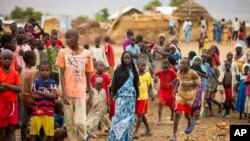The U.N. refugee agency is calling on Cameroon to stop forcibly deporting refugees to Nigeria in violation of international refugee law and a tripartite agreement recently signed by UNHCR, Nigeria, and Cameroon to ensure voluntary returns.
UNHCR says Cameroon is not living up to neither the spirit nor the letter of its agreements to protect refugees. So far this year the agency says Cameroon has forcefully returned more than 2,600 refugees to Nigerian border villages against their will.
UNHCR spokesman Babar Baloch says in one incident on March 17, more than 955 refugees were pushed across the border into Nigeria where their safety cannot be guaranteed.
“Inside Nigeria, UNHCR teams have heard and documented accounts about Cameroonian troops returning refugees against their will, without allowing them time to collect their belongings.... In Nigeria’s Borno State some refugees were rounded up during a military offensive against Boko Haram insurgents in the Mandara Mountains on the Cameroonian side of the border and were taken in trucks to a camp for displaced people in Banki ... in Nigeria,” Baloch said.
Balloch told VOA the Cameroonian military has been forcibly returning Nigerian refugees sporadically since last June.
“Some of the reasons being cited is security. But, those who become the target of these forced returns are refugees who are fleeing Boko Haram inside Nigeria … who are fleeing war and persecution.… It is not the right time for them to return,” Baloch said.
The UNHCR praises the generosity of the government of Cameroon and local communities that are hosting more than 85,000 Nigerian refugees. But it urges the government to honor its obligations under international, regional, and Cameroonian law not to forcibly deport refugees to a country where their lives may be at risk.




